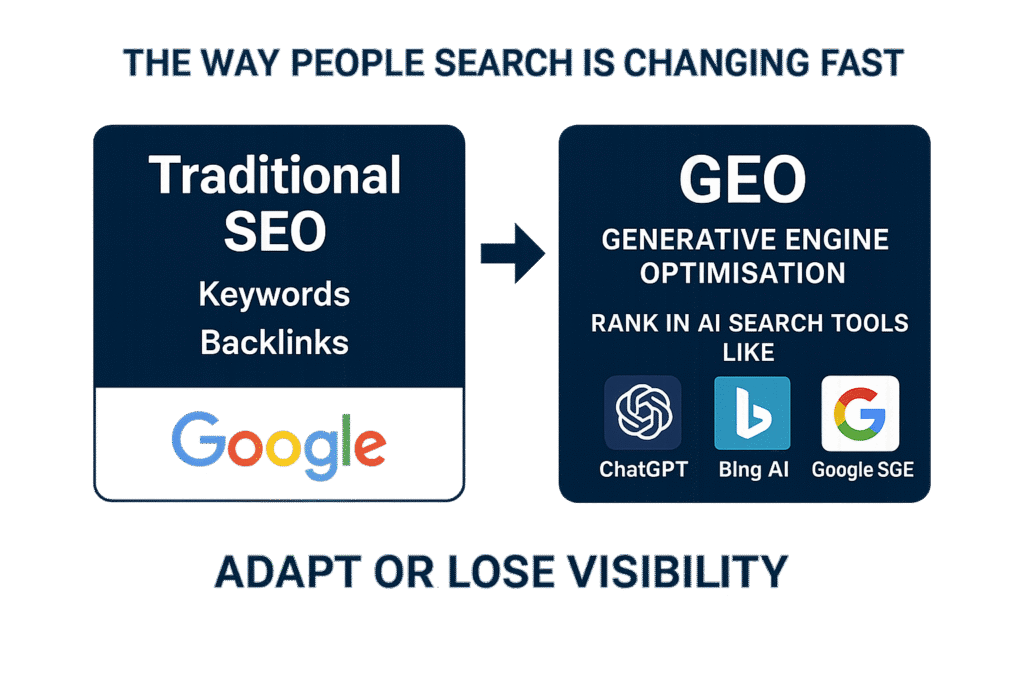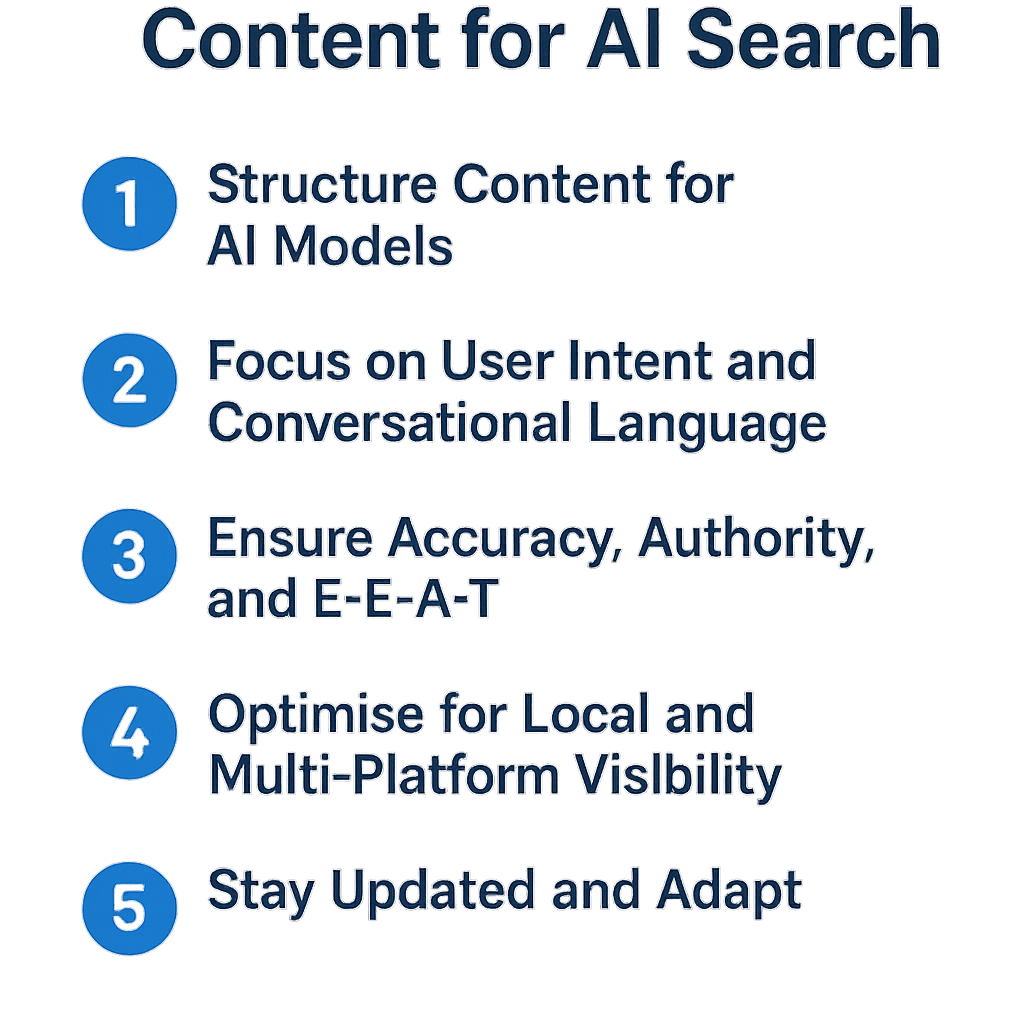
How to Optimise Content for AI Search: A Comprehensive Guide to Ranking Content in AI Search
The world of search is changing rapidly. Remember when “Googling” was the go-to for finding information? Now, we’re entering the age of AI-powered search, where users ask questions and receive direct answers from AI-driven platforms like Google’s Search Generative Experience (SGE), ChatGPT, and Bing AI. This shift from traditional Search Engine Optimisation (SEO) to Generative Engine Optimisation (GEO) requires a new approach to content creation. If you want your content to rank in AI search, you need to understand how these AI algorithms work and adapt your strategy accordingly.
The Evolution of Search: From SEO to GEO

Traditional SEO focused on optimising websites for search rankings based on keywords and backlinks. While those elements still have some importance, AI-powered search prioritises user intent and delivering relevant, comprehensive answers. This is where GEO comes in. GEO goes beyond traditional SEO techniques to make content visible across AI-powered search engines, chatbots, and localised digital platforms.
Why is GEO important?
Businesses that fail to optimise for this shift risk losing online visibility to competitors who embrace AI-driven search strategies. In fact, the search landscape is evolving at an unprecedented pace, and adapting to these changes is crucial for maintaining a strong online presence. You might be wondering, “Will AI replace traditional SEO methods for my website?” It’s a valid question, and understanding GEO will help you find the answer.
Key Differences Between SEO and GEO
To effectively optimise for AI search, it’s crucial to understand the key differences between SEO and GEO:
| FEATURE | TRADITIONAL SEO | GENERATIVE ENGINE OPTIMISATION (GEO) |
| Focus | Keywords and backlinks | Optimising content for AI-powered search |
| Content Type | Static website pages | AI-ready, dynamic content |
| Platforms | Google, Bing, Yahoo | Google SGE, ChatGPT, Bing AI, Perplexity |
| Local Search | Google Maps focus | Google Business Profile + AI platforms |
| Optimisation Tools | SEO tools (Ahrefs, SEMrush) | AI tools + behavioural insights |
| Performance Tracking | Google Analytics | AI-driven search data tracking |
How to Optimise Your Content for AI Search
Here are actionable strategies to help your content rank in AI search:
1. Structure Content for AI Models
AI algorithms favour content that is easy to understand and provides direct answers. To achieve this:
- Use Clear and Concise Headings: Structure your content with logical headings (H1, H2, H3, etc.) that accurately reflect the content of each section. Incorporate relevant keywords naturally.
- Embrace Question-Based Content: Anticipate the questions your target audience is asking and provide comprehensive answers. Use question-and-answer formats, FAQs, and how-to guides.
- Implement Structured Data and Schema Markup: Use schema markup to provide AI search engines with more context about your content, improving your chances of appearing in rich snippets and knowledge panels.
- Utilise Lists and Bullet Points: Present information in a clear, concise, and scannable format using lists and bullet points.
2. Focus on User Intent and Conversational Language
AI-powered search is designed to understand natural language, so:
- Write in a Conversational Tone: Use a natural, conversational style that mimics how people speak. Avoid jargon and complex sentence structures.
- Prioritise User Intent: Create content that directly addresses user queries and provides valuable information. If you’re wondering “How to improve my small business SEO with AI,” focus on providing practical, actionable advice.
- Use Long-Tail Keywords: Incorporate long-tail, conversational keywords that reflect how users actually phrase their questions in AI search. Pay attention to questions like “What is the impact of AI on local SEO?” and tailor your content to provide insightful answers.
3. Ensure Accuracy, Authority, and E-E-A-T
AI algorithms prioritise content that is trustworthy and reliable:
- Maintain Factual Accuracy: Ensure your content is accurate, well-researched, and supported by credible sources. Attribute information and provide citations.
- Demonstrate Expertise, Authoritativeness, and Trustworthiness (E-E-A-T): Create high-quality content that showcases your expertise in the subject matter.

4. Optimise for Local and Multi-Platform Visibility
- Optimise for Local Search and Voice Search: AI assistants like Alexa, Siri, and Google Assistant often provide localised responses. Optimise your Google Business Profile and use geotagging to improve local visibility.
- Adapt Content for Multiple Platforms: Optimise your content for visibility on platforms beyond traditional search engines, such as YouTube, Amazon, and other AI-powered platforms.
5. Stay Updated and Adapt
The AI search landscape is constantly evolving, so:
- Monitor AI Search Trends: Keep up-to-date with the latest algorithm updates and AI search trends.
- Analyse Performance: Track your content’s performance in AI-driven search and refine your strategies based on data and feedback.
The Future of Search is Here
AI-powered search is not just a trend; it’s the future. By embracing these strategies and adapting to the changing landscape, you can ensure your content remains visible, relevant, and valuable in the age of AI. Is your business ready to get found by AI?
Want to learn more about how to optimise your content for AI search? Contact us today for a free consultation!
What is Generative Engine Optimisation (GEO)?
Generative Engine Optimisation (GEO) involves optimising content specifically for AI-driven platforms such as Google’s Search Generative Experience, ChatGPT, and Bing AI, prioritising user intent and conversational queries.
How is GEO different from traditional SEO?
Traditional SEO focuses primarily on keyword ranking and backlinks, while GEO emphasises dynamic, conversational content optimised for direct answers in AI-generated search results.
Why should businesses optimise content for AI search?
Optimising for AI search ensures your content stays visible as search behaviours shift towards conversational and AI-powered platforms, helping you stay competitive.
How can I optimise my content for voice search?
Use conversational language, target question-based keywords, optimise local listings, and ensure content answers questions concisely and clearly.
What type of structured data helps with AI search visibility?
Structured data such as Article schema, FAQ schema, Product schema, and Local Business schema significantly boost content visibility and enable inclusion in AI-driven featured snippets.
Helpful Resources:
Here are some sources that provide valuable insights into AI search, SEO, and content creation:
- Google Search Central: This website offers official documentation and resources from Google on search engine optimisation and best practices. It’s a great source for understanding how Google’s algorithms work.
- Search Engine Land: This website publishes news and analysis about search engine marketing, SEO, and related topics. It’s a good source for staying up-to-date on the latest industry trends.
- Moz: Moz provides SEO software, tools, and resources. Their blog and learning centre offer valuable information on SEO best practices.
- Content Marketing Institute: This website focuses on content marketing strategies and best practices. It offers resources on creating high-quality content that engages audiences.
🔐 No spam. Just smart, simple advice once or twice a month.

